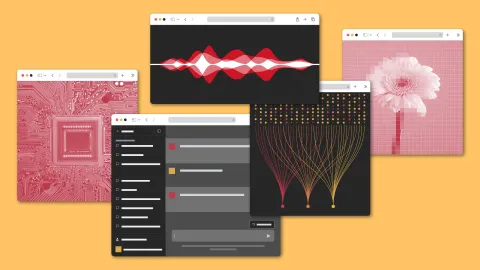Pros and Cons of Big Data
Published February 28, 2024
Series Mentioned in this Post: Big Data for Social Good
One hundred years ago, only a few data points on a person were collected over the span of their lifetime: when they were born, if they got married, and when they died. These details, brief enough to fit on a headstone, give us little insight into what daily life was like for the population in a time before advanced technology and computer development. Imagine the work of researchers and social scientists of the time; they developed and conducted formal studies that took weeks, months, and even years to complete in order to gain more detailed insight on the daily habits and needs of people and communities.
Today, data of every kind is readily available. The mass amount of data collected and accessed every second across the globe is often referred to as “big data” and is used by every kind of industry and organization to shape businesses, cultures, and communities.
What are some pros of big data?
Each time you consult the GPS on your smartphone for directions and receive an estimated time of arrival, you are benefitting from big data. Streaming services like Netflix and Disney+ use algorithms to synthesize big data sets to suggest new shows and movies to watch, and return the most accurate search results. Beyond daily benefits and lifestyle enhancements, big data has paved the way for rapid advancement and innovation across industries including health care, government, business, finance, retail, and more.
Here are just a few of the ways big data positively impacts societies and communities:
Health Care Advancements
Big data revolutionizes health care by enhancing research practices and learnings as well as providing clearer insight into disease prevention, diagnosis, and treatment. Health organizations leverage big data to analyze patient information so they can identify health trends, predict disease outbreaks, and develop treatment plans that improve patient outcomes and population health.
“People are expecting data to be used for the purposes of improving health care outcomes.”—Katherine Chou, Director of Research and Innovation at Google and speaker in our course Digital Health, taught by Stanley Y. Shaw, MD, PhD, Associate Dean for Executive Education at Harvard Medical School.
Improved Public Services
Governments use big data analytics to improve public services, optimize resource allocation, and enhance citizen engagement. From urban planning and traffic management to health care delivery and emergency response, big data enables governments to make data-driven decisions that benefit citizens and communities.
Educational Innovation and Impact
Big data transforms education by enabling personalized learning experiences, adaptive learning platforms, and data-driven teaching methods. Educators use big data analytics to track student progress, identify learning gaps, and tailor instructional content to individual student needs, fostering student engagement and academic success.
In our course Big Data for Social Good, Professor Raj Chetty uses big data to evaluate the impact of class size on student learning outcomes as well as to measure the effect a college education has on upward mobility for students from different socioeconomic and geographic backgrounds.
Social and Environmental Impact
Big data helps climate and social activists and policymakers address environmental and social challenges by using data-driven solutions and evidence-based policymaking. From monitoring climate trends and disaster response to developing social welfare programs and humanitarian aid, big data analytics empowers organizations and policymakers to develop solutions to pressing societal issues and drive positive social change.
For example, Professor Raj Chetty’s ground breaking research on social mobility used massive datasets to reveal findings that are already informing public policy and making it easier for communities to achieve social and economic mobility. In our course Big Data for Social Good, you can get a closer look at these findings and understand how to use them for good within your own community and organization.
What are some cons of big data?
While big data has made a positive impact across industries and society at large, it also presents challenges that anyone who uses data to make decisions or improvements should be aware of:
Data Privacy and Security Concerns
One of the primary concerns with big data is the potential for data privacy breaches and security vulnerabilities. Collecting and analyzing large volumes of data increases the risk of unauthorized access, data leaks, and cyber attacks, posing privacy and security risks for individuals and organizations. Our course, Data Privacy and Technology, explores these risks and offers solutions and strategies for managing data responsibly.
Cost of Implementation
Implementing big data solutions often involves significant upfront costs for organizations, including investments in infrastructure, software, and staff. Organizations may also incur ongoing expenses for data storage, processing, and maintenance, making big data initiatives financially challenging for some businesses, especially those in the nonprofit and education sectors.
Bias and Discrimination
Big data algorithms may exhibit bias and discrimination based on factors such as race, gender, and socioeconomic status. Biased algorithms can perpetuate existing inequalities and undermine trust in automated decision-making systems. This is particularly true in health care and financial systems, where historic and systemic oversights of marginalized populations combine to create discriminatory results. Studies have found that discrimination still persists even with the removal of human intervention as algorithms can only be as good as the data sets they are informed by. Biased data sets lead to biased results.
"Inequities in the health and criminal justice system, police brutality issues, issues around covid, these are all problems that big data can affect."—Ed Davis, CEO/President of the Edward Davis Company, speaker in Data Science Principles. Learn more about the uses of data in our course Data Science Principles, taught by Harvard Professor Dustin Tingley.
How to use big data to benefit organizations and society
From the limited information of the past to the vast landscape of data points available to us today, the emergence of big data has reshaped industries, societies, and daily lives. With its ability to provide insights, drive innovation, and catalyze positive change, big data stands as a cornerstone of modern businesses, organizations, and societies.
Now that you understand the pros and cons of big data and its impact, it’s time to use the data available to you to positively impact your own work and community.
Related ArticlesHow to Take Control of Your Data Health in 2024 Image

The Benefits and Limitations of Generative AI: Harvard Experts Answer Your Questions Image

|